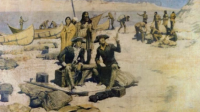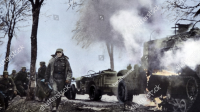Introduction: The Prelude to Conflict
The Second Schleswig War, fought in 1864, was a significant conflict between the Kingdom of Denmark and the combined forces of Prussia and Austria. This war was not only a crucial moment in Danish history but also a pivotal event in the broader context of European power dynamics. The conflict arose from long-standing disputes over the duchies of Schleswig and Holstein, territories that were culturally and politically divided between German and Danish influences. The outcome of the war would not only determine the fate of these duchies but also set the stage for the unification of Germany and the eventual decline of Danish power in the region.
Read Also : German Enlightenment Thinkers (1730): How They Shaped Modern Thought
The Historical Context: Tensions Over Schleswig and Holstein
Before the outbreak of the Second Schleswig War, the duchies of Schleswig and Holstein had been a source of contention for centuries. These territories were situated on the border between Denmark and the German Confederation, making them strategically important for both sides. The complex history of these duchies, with their mixed populations of Germans and Danes, led to a series of disputes over sovereignty and national identity.
The Schleswig-Holstein Question: A Diplomatic Quagmire
The so-called “Schleswig-Holstein Question” was one of the most complicated diplomatic issues of the 19th century. The duchies were legally part of the Danish monarchy, but they were also members of the German Confederation. This dual allegiance created a situation where both Denmark and the German states claimed rights over the territories, leading to frequent tensions and conflicts.
The conflict over Schleswig and Holstein was not just about territorial control but also about national identity. The German-speaking population in these duchies identified more with the German Confederation, while the Danish-speaking population felt a stronger connection to Denmark. This division made the region a flashpoint for nationalist sentiments on both sides, contributing to the outbreak of hostilities.
The diplomatic efforts to resolve the Schleswig-Holstein Question had repeatedly failed, as neither side was willing to compromise on their claims. This intransigence eventually led to the First Schleswig War (1848-1851), which ended in a stalemate. The unresolved tensions from this earlier conflict set the stage for the Second Schleswig War, as both sides remained determined to assert their control over the disputed territories.
The Rise of German Nationalism
The rise of German nationalism in the 19th century played a crucial role in the lead-up to the Second Schleswig War. The movement for German unification was gaining momentum, and the duchies of Schleswig and Holstein were seen as integral parts of a unified Germany. The leaders of the German Confederation, particularly Prussia, were eager to assert their influence over these territories as part of their broader goal of unifying the German states.
Prussia, under the leadership of Otto von Bismarck, saw the conflict over Schleswig and Holstein as an opportunity to advance its ambitions for German unification. Bismarck was a master of Realpolitik, and he recognized that a successful war against Denmark could rally the German states around Prussia and weaken Austria’s influence in the German Confederation. This strategic calculation would prove to be a decisive factor in the outbreak and outcome of the Second Schleswig War.
The Danish government, aware of the rising tide of German nationalism, attempted to strengthen its control over Schleswig and Holstein through a series of constitutional reforms. However, these efforts only further inflamed tensions with the German Confederation, as they were seen as an attempt to impose Danish rule over the German-speaking population in the duchies. The stage was set for a confrontation that would have far-reaching consequences for both Denmark and the German states.
The First Schleswig War and Its Aftermath
The First Schleswig War (1848-1851) was the initial military conflict over the duchies, and its outcome had a significant impact on the events leading up to the Second Schleswig War. The first war ended with the London Protocol of 1852, which confirmed Denmark’s sovereignty over Schleswig and Holstein while also maintaining their status as part of the German Confederation. However, the underlying issues were not resolved, and the conflict remained a source of tension between Denmark and the German states.
The London Protocol was a diplomatic compromise that satisfied neither side. The Danish government viewed the protocol as a victory, but the German-speaking population in Schleswig and Holstein felt betrayed, as their aspirations for greater autonomy or unification with Germany were not fulfilled. This dissatisfaction continued to simmer in the years following the first war, creating a volatile situation that would eventually lead to renewed conflict.
The failure of the London Protocol to address the root causes of the conflict meant that the situation in Schleswig and Holstein remained unstable. Both Denmark and the German Confederation continued to prepare for the possibility of another war, and when tensions finally boiled over in 1864, the stage was set for a much larger and more decisive conflict.
The Outbreak of War: Prussia and Austria Join Forces
The Second Schleswig War officially began in February 1864, when Prussian and Austrian forces crossed the border into Schleswig, initiating hostilities against Denmark. This war was marked by the surprising alliance between Prussia and Austria, two rival powers within the German Confederation. Their decision to cooperate against Denmark was driven by a combination of strategic interests and the desire to assert German dominance in the region.
The Alliance of Prussia and Austria: A Strategic Move
The alliance between Prussia and Austria was a strategic masterstroke by Bismarck, who recognized that working together against Denmark would serve both powers’ interests. For Prussia, the war was an opportunity to strengthen its leadership within the German Confederation and to demonstrate its military prowess. For Austria, the war provided a chance to maintain its influence in the German states and to prevent Prussia from becoming too dominant.
Bismarck’s diplomacy was crucial in securing Austria’s participation in the war. Despite their rivalry, Austria agreed to join forces with Prussia in exchange for assurances that the two powers would share control over Schleswig and Holstein after the war. This agreement was formalized in the Treaty of Gastein, which laid out the terms of their cooperation and the division of spoils in the event of victory.
The Prussian-Austrian alliance was a key factor in the outcome of the war, as it allowed the two powers to present a united front against Denmark. The combined military might of Prussia and Austria was overwhelming, and Denmark found itself unable to match the strength of its adversaries. The alliance also served to isolate Denmark diplomatically, as other European powers were reluctant to intervene in a conflict that involved two of the most powerful states in Europe.
The Invasion of Schleswig: The Initial Campaign
The invasion of Schleswig in February 1864 marked the beginning of the military campaign against Denmark. Prussian and Austrian forces quickly advanced into the duchy, overwhelming the Danish defenses and forcing the Danish army to retreat. The speed and efficiency of the invasion caught Denmark off guard, and within weeks, most of Schleswig was under German control.
The initial campaign was characterized by a series of rapid victories for the Prussian and Austrian forces. The Danish army, although well-trained and determined, was outmatched by the larger and better-equipped German forces. The Prussian military, in particular, demonstrated its superiority in terms of organization, strategy, and technology, setting the stage for its later dominance in the wars of German unification.
The invasion of Schleswig was also significant because it highlighted the effectiveness of the Prussian General Staff, which played a key role in planning and executing the campaign. The success of the initial campaign boosted morale among the German forces and reinforced the belief that victory over Denmark was within reach. For Denmark, the rapid loss of Schleswig was a devastating blow, and it signaled the beginning of the end for Danish control over the duchies.
The Siege of Düppel: A Decisive Battle
One of the most decisive battles of the Second Schleswig War was the Siege of Düppel, which took place in April 1864. The fortress of Düppel was one of Denmark’s most important defensive positions in Schleswig, and its fall would open the way for the German forces to advance deeper into Danish territory. The siege was a test of both the military capabilities of the Prussian army and the resolve of the Danish defenders.
The siege began with a massive artillery bombardment by the Prussians, which quickly weakened the Danish defenses. After several days of relentless shelling, the Prussian forces launched a full-scale assault on the fortress, overwhelming the Danish defenders and capturing the position. The fall of Düppel was a turning point in the war, as it effectively broke Danish resistance and paved the way for further German advances.
The victory at Düppel was a significant achievement for the Prussian army, and it demonstrated the effectiveness of the new military tactics and technologies that Prussia had developed. The siege also had a psychological impact on both sides, as it convinced many Danes that the war was lost and bolstered the confidence of the German forces. The fall of Düppel marked the beginning of the end for Denmark in the Second Schleswig War, as the German advance continued unabated.
The Naval Conflict: Denmark’s Struggle at Sea
While the land battles of the Second Schleswig War are often the focus of historical accounts, the naval conflict between Denmark and the German states was also a crucial aspect of the war. Denmark had a strong naval tradition and sought to use its fleet to disrupt German supply lines and protect its coastline. However, the naval conflict ultimately demonstrated the limitations of Danish naval power in the face of superior German resources.
Denmark’s navy initially achieved some successes, including the capture of several German ships and the blockade of key ports. However, the German states, particularly Prussia, quickly adapted to the challenge, increasing their naval capabilities and launching counterattacks against Danish positions. The Danish navy struggled to maintain control of the seas, and as the war dragged on, it became clear that Denmark could not sustain a prolonged naval conflict.
The naval battles of the Second Schleswig War highlighted the growing importance of naval power in modern warfare and the challenges faced by smaller states in maintaining control of their maritime interests. For Denmark, the naval conflict was a reminder of the limitations of its military capabilities and the difficulties of defending a dispersed and vulnerable coastline.
The Treaty of Vienna: The End of the War
The Second Schleswig War came to an end in October 1864 with the signing of the Treaty of Vienna. The treaty marked the formal conclusion of the conflict and the transfer of Schleswig and Holstein from Danish to German control. The terms of the treaty were a severe blow to Denmark, which was forced to cede the duchies to Prussia and Austria, effectively ending its influence in the region.
The Treaty of Vienna was a diplomatic victory for Prussia and Austria, as it confirmed their control over the duchies and solidified their alliance. However, the treaty also set the stage for future conflicts between the two powers, as the division of Schleswig and Holstein would become a source of tension in the years to come. The Second Schleswig War had reshaped the political landscape of Europe, and its consequences would continue to be felt for decades.
For Denmark, the Treaty of Vienna was a devastating loss, marking the end of its ambitions in Schleswig and Holstein and the beginning of a period of national introspection. The war had revealed the limitations of Danish power and the challenges of maintaining sovereignty in a rapidly changing Europe. The loss of the duchies was a turning point in Danish history, leading to significant changes in the country’s foreign and domestic policies.
The Aftermath and Legacy of the Second Schleswig War
The Second Schleswig War had far-reaching consequences for Denmark, the German states, and the broader European balance of power. The war not only redrew the map of northern Europe but also set the stage for the unification of Germany and the decline of Danish influence in the region. The legacy of the war would be felt for decades, as the issues it raised continued to shape European politics.
The Impact on Denmark: A Nation in Decline
The defeat in the Second Schleswig War was a significant blow to Denmark, both politically and psychologically. The loss of Schleswig and Holstein marked the end of Denmark’s ambitions as a regional power and forced the country to reevaluate its role in Europe. The war also led to significant changes in Danish domestic politics, as the government sought to strengthen the country’s defenses and prevent future territorial losses.
The loss of the duchies had a profound impact on Danish national identity, as the country grappled with the consequences of its defeat. The war became a symbol of national humiliation, and the memory of the conflict continued to influence Danish politics and culture for generations. The experience of the Second Schleswig War also led to a more cautious and defensive foreign policy, as Denmark sought to avoid further conflicts with its powerful neighbors.
The Second Schleswig War was a turning point in Danish history, marking the end of the country’s status as a major regional power and the beginning of a new era of political and military retrenchment. The legacy of the war would continue to shape Denmark’s identity and foreign policy for decades to come.
The Path to German Unification
The Second Schleswig War played a crucial role in the unification of Germany, as it demonstrated the effectiveness of Prussian military power and the weakness of Austrian influence in the German Confederation. The war also served as a rallying point for German nationalists, who saw the victory over Denmark as a step towards the creation of a unified German state.
The success of the Prussian-Austrian alliance in the Second Schleswig War laid the groundwork for the later conflicts that would lead to the unification of Germany. The war demonstrated the effectiveness of Bismarck’s Realpolitik, as Prussia used the conflict to strengthen its position within the German Confederation and to undermine Austria’s influence. The victory also helped to solidify Prussia’s leadership role in the movement for German unification.
The Second Schleswig War was a key moment in the process of German unification, as it set the stage for the later wars of unification and the eventual creation of the German Empire in 1871. The war demonstrated the power of nationalism and the effectiveness of military force in achieving political goals, and its legacy would continue to shape the course of European history.
The Decline of Austrian Influence
While Austria emerged from the Second Schleswig War as a victor alongside Prussia, the war also marked the beginning of the decline of Austrian influence in the German Confederation. The division of Schleswig and Holstein between Prussia and Austria created tensions that would later erupt into conflict, as the two powers vied for control over the German states.
The rivalry between Prussia and Austria, which had been temporarily set aside during the Second Schleswig War, would soon resurface in the Austro-Prussian War of 1866. This conflict would result in the decisive defeat of Austria and the exclusion of the Habsburgs from German affairs, paving the way for Prussia to lead the unification of Germany.
The Second Schleswig War was a turning point in the balance of power within the German Confederation, as it signaled the beginning of the end for Austrian influence in the region. The war demonstrated the limitations of Austrian power and the growing dominance of Prussia, setting the stage for the eventual unification of Germany under Prussian leadership.
The European Power Balance: Shifting Alliances
The Second Schleswig War had a significant impact on the broader European balance of power, as it highlighted the growing strength of Prussia and the decline of Denmark and Austria. The war also served as a reminder of the volatility of European alliances, as the unexpected cooperation between Prussia and Austria demonstrated the fluid nature of international relations in the 19th century.
The outcome of the war had far-reaching consequences for European diplomacy, as it reshaped the alliances and rivalries that would define the continent for decades to come. The war also underscored the importance of military power in achieving political goals, as the decisive victory of Prussia and Austria over Denmark demonstrated the effectiveness of force in resolving disputes.
The Second Schleswig War was a key moment in the shifting balance of power in Europe, as it marked the rise of Prussia as a dominant force in German and European affairs. The war also set the stage for the later conflicts that would shape the course of European history, as the issues it raised continued to influence the actions of states and leaders across the continent.
The Legacy of the Second Schleswig War
The legacy of the Second Schleswig War is still felt today, as the conflict had a lasting impact on the history of Denmark, Germany, and Europe as a whole. The war reshaped the map of northern Europe, set the stage for the unification of Germany, and marked the decline of Danish influence in the region. The issues raised by the war, including questions of national identity, sovereignty, and the use of military force, continue to resonate in contemporary discussions of European history and politics.
The Second Schleswig War serves as a reminder of the complex and often volatile nature of international relations, as well as the far-reaching consequences of military conflict. The war also highlights the importance of diplomacy and compromise in resolving disputes, as the failure to address the underlying issues in Schleswig and Holstein ultimately led to a devastating and transformative conflict.
The Second Schleswig War remains a key event in the history of Europe, as its legacy continues to shape the course of European politics and international relations. The war’s impact on the balance of power, the process of German unification, and the history of Denmark and Austria serves as a testament to the enduring significance of this pivotal conflict.
Conclusion: The Enduring Significance of the Second Schleswig War
The Second Schleswig War of 1864 was a turning point in European history, with far-reaching consequences for Denmark, Germany, Austria, and the broader European balance of power. The war not only determined the fate of Schleswig and Holstein but also set the stage for the unification of Germany and the decline of Danish influence in the region.
The war demonstrated the power of nationalism, the effectiveness of military force, and the complexities of international relations in the 19th century. The legacy of the Second Schleswig War continues to resonate today, as the issues it raised continue to influence discussions of European history and politics.
The Second Schleswig War remains a key event in the history of Europe, serving as a reminder of the transformative power of conflict and the enduring impact of historical events on the present.
FAQ About the Second Schleswig War
What was the Second Schleswig War?
The Second Schleswig War was a conflict fought in 1864 between Denmark and the combined forces of Prussia and Austria. The war was primarily over the control of the duchies of Schleswig and Holstein, which were disputed territories with both Danish and German populations.
What caused the Second Schleswig War?
The Second Schleswig War was caused by long-standing disputes over the sovereignty of the duchies of Schleswig and Holstein. The rise of German nationalism, the unresolved tensions from the First Schleswig War, and the ambitions of Prussia and Austria for territorial expansion also contributed to the outbreak of the conflict.
What was the outcome of the Second Schleswig War?
The Second Schleswig War ended with a decisive victory for Prussia and Austria. The Treaty of Vienna, signed in October 1864, resulted in Denmark ceding control of Schleswig and Holstein to the German powers. The war marked the decline of Danish influence in the region and set the stage for the unification of Germany.
How did the Second Schleswig War impact German unification?
The Second Schleswig War was a key moment in the process of German unification. The war demonstrated Prussia’s military strength and leadership within the German Confederation, laying the groundwork for the later wars of unification and the eventual creation of the German Empire in 1871.
What is the legacy of the Second Schleswig War?
The legacy of the Second Schleswig War includes the redrawing of the map of northern Europe, the decline of Danish influence, and the rise of Prussia as a dominant power in Germany. The war also had a lasting impact on the European balance of power and continues to be studied as a significant event in the history of Europe.







Its like you read my mind! You appear to know a lot about this, like you wrote the book in it or something. I think that you can do with some pics to drive the message home a little bit, but instead of that, this is wonderful blog. A fantastic read. I will certainly be back.
You are a very intelligent person!
Hi! I’ve been following your website for a long time now and finally got the bravery to go ahead and give you a shout out from Humble Tx! Just wanted to mention keep up the great job!
This website online is known as a walk-by way of for the entire data you wanted about this and didn抰 know who to ask. Glimpse right here, and you抣l undoubtedly discover it.
Thanks for your help and for writing this post. It’s been great.
May I request that you elaborate on that? http://www.hairstylesvip.com Your posts have been extremely helpful to me. Thank you!
Thank you for sharing this article with me. It helped me a lot and I love it. http://www.hairstylesvip.com
Thanks for posting. I really enjoyed reading it, especially because it addressed my problem. http://www.hairstylesvip.com It helped me a lot and I hope it will help others too.
May I have information on the topic of your article? http://www.hairstylesvip.com
Can you write more about it? Your articles are always helpful to me. Thank you! http://www.hairstylesvip.com